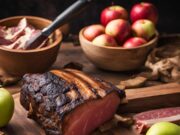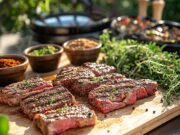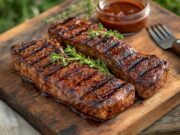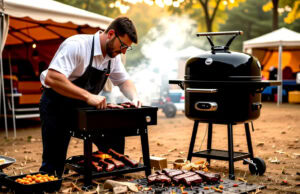- Key Takeaways:
- The Essentials of BBQ: Understanding the Basics
- Mastering Fire Management: The Two-Zone Fire Technique
- Flavor Enhancement: Experimenting with Wood Smoke
- Marinades and Rubs: Perfecting Flavor Profiles
- Temperature Control: The Importance of a Meat Thermometer
- The Art of Resting Meat: Why Patience Pays Off
- Grilling Techniques: Achieving the Perfect Sear
- Safety First: BBQ Precautions and Best Practices
- Elevating the BBQ Experience: Creative Grilling Ideas
- Hosting a Memorable Backyard BBQ: Tips for Success
- Frequently Asked Questions
Are you prepared to elevate your grilling skills to the next level? This guide offers advanced BBQ tips designed to transform your backyard cookouts into exceptional culinary experiences.
You will learn fire management techniques and explore unique wood flavors, equipping yourself with the tools necessary to enhance your BBQ game.
Discover how marinades and rubs can enrich flavor profiles, understand the significance of temperature control, and explore creative ideas that will impress your guests.
Prepare to grill with the expertise of a professional.
Key Takeaways:
- Master the art of fire management with the two-zone fire technique to achieve perfectly cooked meats.
- Enhance the flavor of your BBQ by experimenting with different types of wood smoke and choosing the right wood for different meats.
- Don’t overlook the importance of temperature control, resting meat, and proper grilling techniques to elevate your BBQ game and create a memorable experience for your guests.
The Essentials of BBQ: Understanding the Basics
Understanding the essentials of BBQ is crucial for anyone looking to master outdoor cooking, as it provides the fundamental knowledge required to create delicious grilled meats and vegetables while ensuring safety and flavor development.
Each type of grilling technique, whether direct or indirect heat, plays a vital role in achieving the perfect texture and smoky flavor in your dishes. It is essential to grasp these basics before diving deeper into advanced barbecue practices.
Equipping yourself with a solid understanding of these methods not only enhances your overall culinary experience but also builds your confidence in outdoor cooking.
By exploring different approaches like smoking, searing, and using marinades, you can unlock a world of diverse flavors that will impress family and friends alike. Emphasizing safety precautions such as proper temperature control and food handling ensures that every BBQ session remains enjoyable and hazard-free.
Ultimately, a comprehensive understanding of these basic techniques elevates your skills, paving the way for innovative and memorable culinary adventures.
Mastering Fire Management: The Two-Zone Fire Technique
Mastering fire management is an essential skill for any grilling expert, and employing the two-zone fire technique is one of the most effective methods for achieving perfectly cooked meat and vegetables on either a charcoal or gas grill. This technique involves creating two distinct heat zones—one for direct heat and the other for indirect heat. This setup allows you to sear your meat to perfection while simultaneously cooking it through with the gentler heat of the indirect zone, ensuring both flavor retention and safety during outdoor cooking.
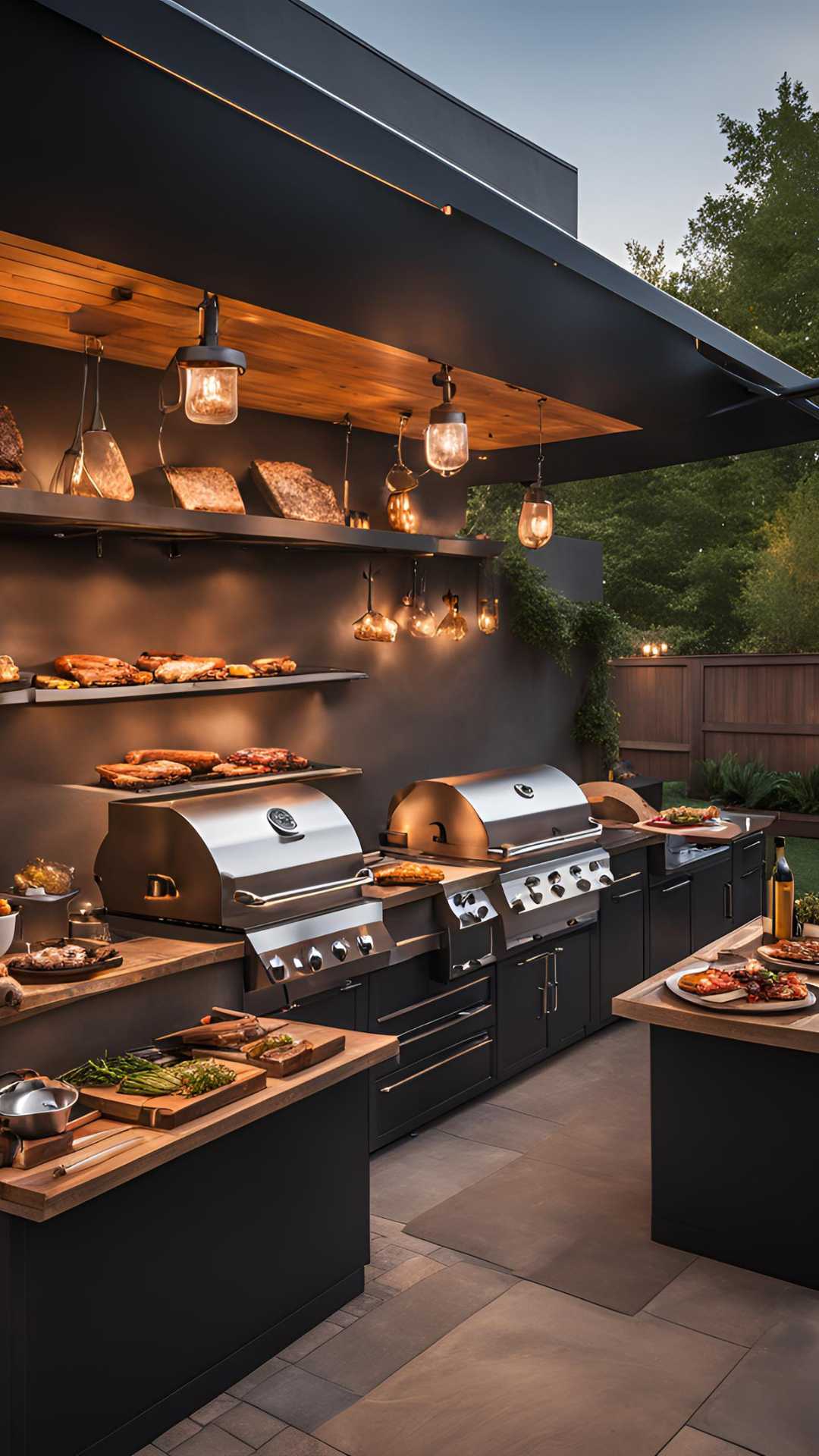
Setting up a two-zone fire is relatively straightforward, whether you are using a charcoal grill or a gas grill. For charcoal grills, start by piling the coals on one side of the grill to create a hot zone while leaving the other side empty for indirect cooking. If you are using a gas grill, you can achieve a similar setup by turning on only one half of the burners, maintaining control of the cooking temperature across the grill surface.
This method not only maximizes efficiency but also allows you to master temperature control, preventing overcooking and fostering perfect results with a variety of dishes. As it offers versatility in cooking styles and techniques, the two-zone fire technique is a vital strategy in any grilling repertoire.
Flavor Enhancement: Experimenting with Wood Smoke
Flavor enhancement plays a pivotal role in grilling, and experimenting with various types of wood smoke, such as Applewood, Hickory, and Mesquite, can significantly elevate your BBQ experience by imparting rich, smoky flavors to meats and vegetables.
Each type of wood brings its own unique characteristics, allowing you to create distinct flavor profiles that transform ordinary dishes into extraordinary culinary delights during your outdoor cooking sessions.
For example, Applewood offers a subtly sweet taste, making it particularly suitable for lighter meats like chicken and pork, while Hickory provides a robust, hearty flavor that complements beef and ribs exceptionally well. Mesquite, known for its intense and earthy smoke, imparts a bold profile, making it ideal for grilling stronger-flavored cuts.
To utilize wood smoke effectively, it is recommended to soak wood chips in water for at least half an hour before adding them to your grill. This practice helps moderate the heat and extends the smoking duration. As you gain confidence with different woods, consider blending varieties to discover unique flavor combinations that align with your personal palate and adventurous spirit in grilling.
Choosing the Right Wood for Different Meats
Choosing the right wood for different meats is essential to maximize flavor development during grilling, as each type of wood can either complement or enhance the specific flavors inherent in various cuts of meat. For instance, Applewood provides a mild, fruity smoke that pairs beautifully with poultry, whereas Hickory delivers a robust flavor ideal for pork and beef. Mesquite, on the other hand, imparts a strong, earthy quality that works well with red meats. Therefore, selecting the appropriate wood is a critical component of mastering outdoor cooking.
When experimenting with wood selection, it is also beneficial to consider blending different woods to create unique flavor profiles. For example, mixing Cherry and Oak can yield a sweet yet smooth smoke that enhances the rich flavors of brisket or ribs. Additionally, using fruitwoods like Peach or Pear not only adds a subtle sweetness but can also help to tenderize meats, especially when paired with fattier cuts.
To optimize the smoking process, controlling the temperature and ensuring a consistent smoke is vital. Low and slow cooking will allow the wood’s natural sugars to caramelize and deeply infuse the meat. Always remember to soak wood chips before use, as this practice can help produce a slower, steadier smoke.
Marinades and Rubs: Perfecting Flavor Profiles
Perfecting flavor profiles through marinades and rubs is an essential technique for any grilling enthusiast, as these preparations enhance the overall taste of meats and vegetables while adding depth to your BBQ dishes. Marinades, typically composed of acidic components, oils, and spices, infuse flavors into the meat, while dry rubs, created from a blend of spices and herbs, form a flavorful crust when grilled, ensuring every bite is an enjoyable experience.
Understanding the different types of marinades and rubs can significantly elevate the quality of your dishes. For instance, a citrus-based marinade works wonders with chicken, providing a refreshing zest, while a sweet and smoky rub pairs beautifully with ribs, creating that desirable bark.
Regarding vegetables, a simple olive oil and herb marinade can transform grilled zucchini or peppers into a savory delight. Exploring various combinations, such as a garlic and rosemary rub for lamb or a tangy vinegar-based marinade for pork, allows you to experiment and discover flavor pairings that align perfectly with your palate.
Allow the meat or vegetables to marinate for at least 30 minutes or up to 24 hours for optimal flavor absorption, ensuring a burst of taste that resonates with every bite.
Temperature Control: The Importance of a Meat Thermometer
Temperature control is essential in the realm of grilling, and using a meat thermometer is one of the best practices to ensure your meats are cooked both safely and to perfection. By accurately monitoring internal temperatures, you can achieve your desired levels of doneness while also minimizing the risk of foodborne illnesses. This makes the meat thermometer an critical tool for any BBQ chef who aspires to excel in outdoor cooking.
Understanding the recommended internal temperatures for various types of meat is crucial. For example, poultry should reach a minimum of 165°F to ensure safety, while ground meats need to be cooked to at least 160°F. Steaks and roasts can be prepared to different degrees of doneness, with rare at 125°F, medium at 160°F, and well-done at 170°F.
Along with monitoring temperature, it is wise to allow the meat to rest for a few minutes after cooking to enhance juiciness and flavor. Always remember to clean the thermometer between uses to prevent cross-contamination, making it an essential item in any grilling enthusiast’s toolkit.
The Art of Resting Meat: Why Patience Pays Off
The art of resting meat is a crucial step in the grilling process that should not be overlooked. This practice allows the juices to redistribute throughout the meat, enhancing both flavor and texture after cooking. By letting your grilled meats rest for a few minutes after removing them from the grill, you can significantly improve the overall quality and enjoyment of your barbecue dishes, highlighting the importance of patience in your outdoor cooking technique.
Different cuts of meat benefit from varying resting times; for instance, a steak should rest for about 5 to 10 minutes, while larger cuts like brisket may require up to 30 minutes or more. This resting period enables the fibers to relax, resulting in a juicier and more tender final product. During this time, complex flavors develop, allowing marinades and seasonings to fully permeate the meat.
Understanding how resting impacts the final taste and texture can help you elevate your grilling game, ensuring that every bite is bursting with flavor.
Grilling Techniques: Achieving the Perfect Sear
Achieving the perfect sear is one of the hallmark techniques in grilling that enhances the appearance of your meats while locking in flavors and moisture for an unforgettable BBQ experience. By utilizing high temperatures and proper grilling techniques—such as managing hot spots and employing direct heat—you can create that desirable crust while ensuring the inside remains juicy and tender. Mastering this skill is essential for any outdoor cooking enthusiast.
To elevate your grilling to a new level, it is crucial to pay attention to the different types of meats being cooked. Whether you are working with steak, chicken, or pork, each requires specific heat settings to achieve optimal results.
Understanding the fundamentals of temperature control not only aids in attaining that coveted sear but also plays a vital role in food safety—a key aspect that should never be overlooked. Always ensure that your meats reach their appropriate internal temperatures, allowing you to enjoy both a delicious and safe BBQ feast.
By incorporating these techniques into your grilling repertoire, a well-prepared outdoor gathering is well within your reach.
Safety First: BBQ Precautions and Best Practices
Safety should always be your top priority when engaging in BBQ and outdoor cooking, as improper handling and cooking practices can lead to foodborne illnesses and accidents. By adhering to essential safety precautions—such as proper food storage, cooking to the correct temperatures, and maintaining a clean grill—you can ensure a safe and enjoyable grilling experience for yourself and your guests while savoring the delicious flavors of your barbecue creations.
It is prudent for you to keep raw meats separate from ready-to-eat foods to avoid cross-contamination. Utilizing separate cutting boards and utensils can significantly enhance your hygiene practices.
Regarding equipment handling, ensuring that your grill tools are in good condition and safely stored when not in use is equally important. Regularly inspecting and cleaning your grill after each session will not only prolong its lifespan but also help prevent flare-ups that could lead to burns or other injuries.
Emphasizing these practices will contribute significantly to creating a relaxed atmosphere where everyone can enjoy the pleasure of outdoor cooking without unnecessary risk.
Elevating the BBQ Experience: Creative Grilling Ideas
Elevating your BBQ experience involves more than simply grilling meat; it requires incorporating creative grilling ideas that will surprise and delight your guests while adding variety to your outdoor cooking menu. Consider including options like grilled vegetables, unique sides such as potato salad, and appetizers like watermelon skewers and grilled peach salad. The possibilities for enhancing flavors and showcasing your culinary skills during a cookout are endless.
Expanding your repertoire of grill-friendly dishes opens up a world of flavor that can satisfy even the most discerning palate. For a delightful twist, think about grilling fruits like pineapple and peaches, which provide a smoky sweetness that pairs beautifully with savory meats. Experimenting with marinades—such as a zesty citrus blend or a spicy sriracha mix—can infuse proteins and vegetables with exciting new flavor dimensions.
Do not overlook the importance of side dishes; grilled corn on the cob brushed with garlic butter or a fresh caprese salad featuring grilled tomatoes can elevate any meal. For appetizers, consider skewering shrimp and cherry tomatoes with herbs for an easy, bite-sized treat that bursts with flavor. Your guests will undoubtedly be impressed by the unexpected twists you incorporate into this outdoor culinary adventure.
Hosting a Memorable Backyard BBQ: Tips for Success
Hosting a memorable backyard BBQ requires meticulous planning and attention to detail to ensure that your outdoor cooking experience is enjoyable and successful for both you and your guests. From selecting the right grilling techniques and flavors to creating a comfortable atmosphere, every aspect contributes to an unforgettable cookout that showcases your skills as a grilling expert.
Start with a well-thought-out menu that caters to the preferences and dietary restrictions of your guests. Incorporating a mix of classic BBQ staples, such as burgers and sausages, along with vegetarian options, ensures that you satisfy everyone’s taste buds.
Equally important is the ambiance; consider setting up outdoor lighting and comfortable seating arrangements to encourage relaxation and enjoyment. Organization plays a critical role, so preparing marinades and sides in advance will streamline the cooking process, allowing you more time for mingling with your guests.
Additionally, don’t overlook the importance of creating a welcome vibe with music that complements the atmosphere, transforming your BBQ into not just a meal, but a delightful experience.
Frequently Asked Questions
What are some advanced BBQ tips to elevate my grilling game?
Some advanced BBQ tips to elevate your grilling game include using a meat thermometer to ensure perfect doneness, marinating meats for added flavor, and using a charcoal chimney starter for evenly heated coals.
Why is it important to use a meat thermometer when grilling?
Using a meat thermometer is important because it ensures that your meat is cooked to the proper temperature, minimizing the risk of foodborne illnesses and ensuring the best flavor and texture.
How can I add more flavor to my grilled meats?
One way to add more flavor to your grilled meats is by marinating them. You can also use rubs, brines, and sauces to add an extra layer of flavor.
What is a charcoal chimney starter and how can it help with grilling?
A charcoal chimney starter is a tool used to evenly heat charcoal for grilling. It eliminates the need for lighter fluid, which can leave a chemical taste on the food, and ensures that coals are evenly heated for consistent cooking.
Are there any vegetables that are great for grilling?
Definitely! Some vegetables that are great for grilling include bell peppers, zucchini, corn on the cob, and asparagus. Just make sure to coat them in oil and seasonings before grilling for maximum flavor.
How can I prevent flare-ups on the grill?
To prevent flare-ups on the grill, make sure to trim excess fat from meats, keep a spray bottle of water nearby to extinguish any flames, and avoid overcrowding the grill with too much food.


